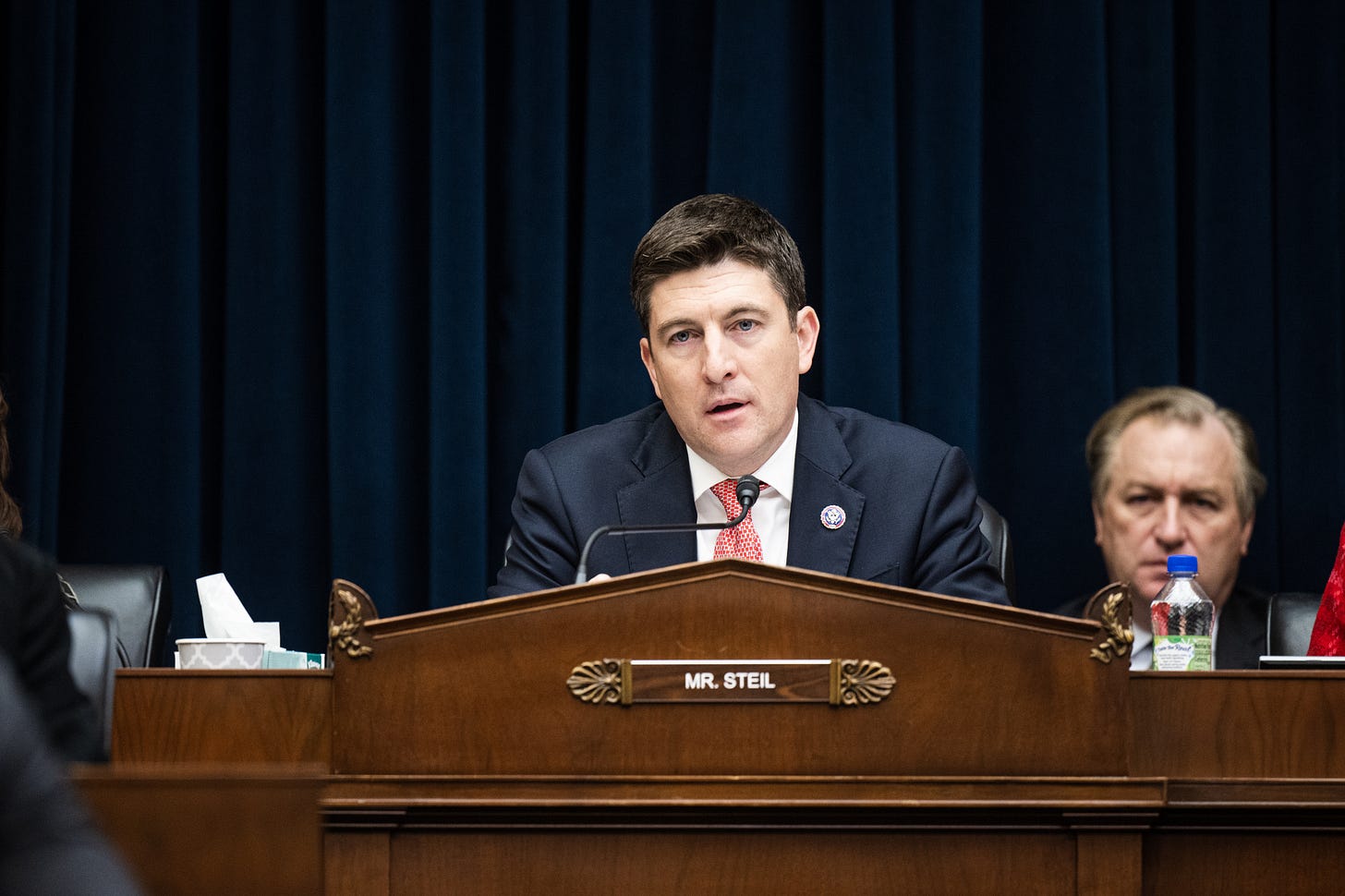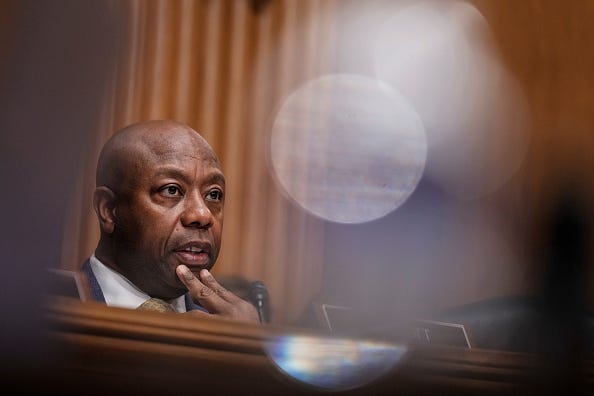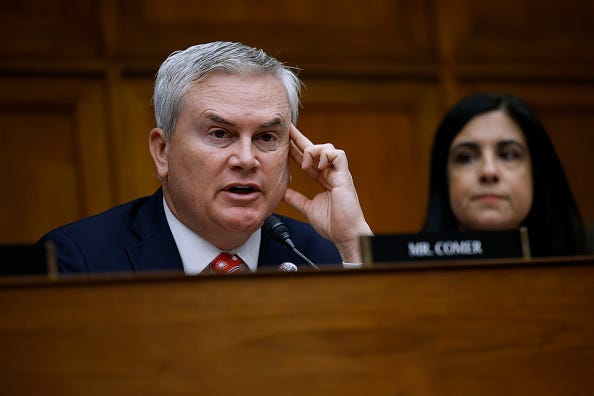Talking With Bryan Steil; Pot Banking Redux; ESG Circus Hits the Hill
Capitol Account: Free Weekly Version
A lot going on, as always, in the financial regulatory world. This week we took a look at the renewed push on Capitol Hill to allow banks to work with marijuana businesses— a seemingly endless quest that always seems to get bogged down in politics. Despite a lot of bipartisan support (and more and more states legalizing weed), there are still a lot of tough issues to sort through before the law gets changed. The House also held its first major hearing on the environmental, social and governance investing movement, an issue that Republicans have been eager to highlight. Suffice it to say, the session was much more entertaining than substantive. That may spell problems for the big asset management firms, likely next on the GOP target list. And for our Friday interview, we sat down with an up and coming member of the House Financial Services Committee who’s known as a bit of a policy wonk.
Thanks for reading our free Saturday edition, with abbreviated versions of stories that we published earlier this week. We ran a lot of other articles in our paid newsletter, including a look at the proposed FDIC levy on big banks to cover the almost $16 billion cost of rescuing Silicon Valley and Signature bank customers and a piece on what seems to be the SEC’s sideways attempt to ban crypto. At least that’s what token firms and investors think. If you’d like to get our full coverage in a more timely manner, we’d love to have you subscribe.
Friday Q and A: The Republican takeover of the House has set the Financial Services Committee on a new path, especially as it relates to oversight of the Biden administration’s regulators. But with the shaky economy, the collapse of FTX and the recent string of regional bank failures, the panel has a lot on its agenda. Looking to get a handle on how lawmakers are grappling with so many pressing issues at once, we called up Rep. Bryan Steil.
First elected in 2018, the Wisconsin Republican has been quietly carving out a niche on the panel dealing with some of the more complicated matters in financial regulation, including the oversight of proxy advisors and ESG investing. He also pays a lot of attention to the SEC and its very busy chair, Gary Gensler. Steil is known for digging into the details of policy, a trait that sets him apart from some others on Capitol Hill who prefer to operate in the realm of soundbites and YouTube clips. Partly for that reason, he’s been pegged as an up-and-comer by some of his colleagues and congressional staff members. Republicans' decision to hand him the gavel of the House Administration Committee this year, they note, is perhaps an early sign that he is headed for bigger things.
Read on to learn Steil’s views about the SEC’s furious pace of rulemaking, the prospects for legislation on digital assets and why he thinks he might share a resemblance to another well-known native of Janesville, Wisconsin. What follows is our (lightly edited and condensed) conversation.
Capitol Account: How did you get to Congress?
Bryan Steil: This is my third term. I had never run for elected office before, so I'm four-and-a-half years into this new world. My background was really in manufacturing. For 10 years I worked for two different major manufacturers in southeast Wisconsin.
CA: How does your business background help you as a lawmaker?
BS: I like to think that I bring that mindset of continuous improvement, like Lean Six Sigma. Bringing things you learned on the shop floor to Congress, on how we can make improvements here.
CA: What interests you in the financial services space?
BS: I had done work for a publicly traded company [including dealing with] all their public filings. I have a background in securities law. So I’ve taken a specific interest in how Chairman Gensler is running the SEC. And previously, how Jay Clayton was operating in that position.
CA: There is a bit of a contrast.
BS: There is definitely a difference. Chairman Gensler is really running an aggressive playbook – rulemaking and enforcement actions…I struggle with the way that Gensler is operating, both on the enforcement side and the rulemaking. We see the rulemaking process accelerated, and it’s sometimes far more opaque than it should be. There are a lot of questions as to why the chairman is pushing forward in the ways that he is.
CA: What stands out to you about Clayton’s tenure?
BS: Jay Clayton ran a long substantive analysis and review as it relates to proxy advisor reforms. He got a rule more or less in place, only to see it be scrapped by Gensler. I’ve got a lot of questions as to why that happened.
CA: Talk to us about that. Oversight of proxy advisory firms is a key issue for you. You’ve introduced legislation to rein in Institutional Shareholder Services and Glass Lewis, the two main proxy advisors who many critics say are a powerful duopoly.[Here’s a link to a website Steil put together about the issue.]
BS: ISS and Glass Lewis jointly have about 97 percent market share. That's almost a textbook definition of a duopoly. Why is that important? Because somewhere in the neighborhood of 70 percent of outstanding shares of publicly traded U.S. companies are held by institutional investors – mutual funds, pension funds, etc. And the voting for shareholder proposals? We're finding it less and less in the hands of retail investors…and more and more in the hands of asset managers, often relying on the advice of two proxy advisor firms.
CA: Why is that bad?
BS: You want the actual retail investors to have their voices heard. We have seen instances where a woke corporate agenda is being pushed.
CA: Most people would tell you that few retail shareholders are likely to want to vote on all the proposals in, say, their S&P 500 index fund. How do you deal with that?
BS: I'd like the free market to work that out. And I think it would, if you broke the duopoly. Vanguard is exploring this with a pilot program…There's a whole host of free market solutions, as simple as when you sign up with an asset manager you could choose your own proxy advisor firm to vote your shares. You could follow a benchmark.
CA: You are on the new financial services’ digital assets subcommittee. Will a divided Congress be able to pass crypto legislation?
BS: It's a bite at a time, right? I don't know that we will have massive, comprehensive, holistic legislation that will come out and get across the line. But I do think there's areas of broad agreement, and often in a nonpartisan way – particularly as we look at stablecoins, as we look at registration of some of these players. We have an ability to provide that regulatory certainty. And I think at the end it will show that we can protect investors and consumers, but we can also spur development and innovation here in the United States rather than abroad.
CA: A lot of our readers were interested that you asked Gensler at the recent oversight hearing about his use of other email addresses. What was the genesis of that?
BS: In 2013 while he was at the CFTC, the inspector general raised concerns about his history of misusing email…We're looking for where we should be obtaining information. I just wanted to know on the record what email address, or addresses, he's using. So when we're making our requests we can be as effective as possible.
CA: How about the use of non-work accounts or messaging services like WhatsApp? Is that a concern?
BS: What we're looking for is transparency in the rulemaking process, which is why as a federal government we have rules and regulations regarding freedom of information…I think that's a pretty straightforward process. We've seen individuals abuse that – you can go back to Hillary Clinton's emails if you want. I think you could just simply look at Chairman Gensler's 2013 incident and the IG report while he was at the CFTC to get a flavor of the way that some individuals have acted to thwart oversight and transparency.
Follow us on Twitter @CapitolAccount and on LinkedIn by clicking here. We’re always looking for stories, so if you have any suggestions on what we should cover (or comments about Capitol Account), shoot us a note. Jesse can be reached at: jwestbrook@capitolaccountdc.com and Rob at: rschmidt@capitolaccountdc.com. If somebody forwarded this to you and you’d like to subscribe, hit the button below. Please email for our special rates for government employees and academics, and group discounts for businesses: subscriptions@capitolaccountdc.com.
Banking Weed: There’s no question that bankers’ top concerns in Washington are the debt-limit fight and fending off tougher rules in the wake of the high-profile failures of regional lenders. But not too far down the list is persuading lawmakers to finally pass legislation allowing banks to service marijuana businesses – a policy goal that has experienced a number of false starts on Capitol Hill in past years. Many in the industry are hoping that a hearing Thursday that featured a bipartisan duo of Senate supporters will provide a fresh jolt for the bill. We’ll see.
There were certainly some hopeful signs during the roughly two-hour Senate Banking Committee session. For starters, it was full of acknowledgements from both Democrats and Republicans that weed companies’ lack of access to financial services is becoming a pressing problem. Banks won’t touch these businesses (legal in many states) because the federal government still labels pot an illegal dangerous substance. So the majority of retailers can only accept cash, making them highly vulnerable to money laundering, robberies and other crimes, lawmakers said.
The threat of illicit activity is a big reason why Jeff Merkley, an Oregon Democrat, and Steve Daines, a Montana Republican, say they teamed up earlier this year to reintroduce the SAFE Banking Act (standing for Secure and Fair Enforcement). They were the first witnesses; both their states have legalized the recreational use of marijuana. Despite their bipartisan bonafides, it didn’t take long for a few thorny political issues to emerge – providing some evidence for why it has been so tough to get the measure signed into law. (The bill has been introduced in every Congress since 2017.)
One key sticking point arose when Tim Scott, the committee’s ranking Republican, said he believed there’s a provision in the legislation that would ensure that any legal business, not just a marijuana company, won’t be denied banking services. This is important, he stressed, because some banks have stopped lending to companies that are out of favor with liberals. “In the past few years, we have seen certain financial institutions cave to political pressures and take actions to de-bank certain legal industries, such as firearms and oil and gas entities, due to the wild progressive nature of the radical left,” Scott said.
Merkley confirmed that there is indeed language in the bill that would “address the issue of reputational risk being used against certain parts of the economy in an inappropriate way.” While that statement was pretty (purposefully?) difficult to follow, Jack Reed of Rhode Island cleared things up. He pointed out that the provision would make it a lot harder for bank regulators to force firms to drop certain customers, even if those clients pose “significant risk to the bank.” Reed added that he thinks this is a very bad idea, especially in a bill meant to be only about weed...(Thursday)
ESG Circus: There’s never going to be a middle ground of opinion on the ESG investing movement – a point that became clear only a few minutes into Wednesday’s lengthy House Oversight and Accountability Committee hearing. But maybe that doesn’t matter. Because the other takeaway from the three-and-a-half-hour session is that both parties see substantial benefits in the political theater and ESG’s ability to drive a wedge in the culture wars.
So the debate is not likely to go away any time soon, even if nobody can agree on what ESG means. “To those watching it may seem like there were two different hearings going on today,” Chairman James Comer noted in what was a bit of an understatement.
Republicans on the panel portrayed ESG as a dangerous movement spearheaded by a cabal of global elites – lefty executives, the United Nations, proxy advisors and asset management firms, to name a few – pushing policies that America’s elected officials would never agree to pass. At risk: retirees’ savings, energy independence, U.S. national security and the entire economy. And if that isn’t bad enough, the main beneficiary may be China.
Democrats, however, said ESG is merely “data” used by responsible money managers to assess risk and allocate capital in a way that seeks the best returns for investors. Doing any less, they argued, would violate the strict duty to put clients’ interests first. The anti-ESG backlash, Democrats countered, is funded through “dark money” by a different sect of elitists comprised of oil companies and conservative activists. Democrats also enjoyed pointing out that their Republican counterparts seem to have no compunction about abandoning their free market principles to tell businesses what to do, at least when it comes to climate and other social policies.
Interestingly enough, the only companies that were mentioned with any regularity were BlackRock and the proxy advisory firms ISS and Glass Lewis (all of which have long been targets of the anti-ESG crowd). But there were hints from Republicans that other financial firms are also going to be in the dock. “What I don’t think the Democrats understand is this affects banking and insurance, it's not just investing,” Comer noted. “This ESG is a political movement that’s gaining ground, it’s gaining ground on Wall Street.” Among his concerns, he said, are banks refusing to do business with firms that don’t follow ESG goals and insurance companies incorporating those standards into underwriting.
Still it’s debatable how much risk there may be for the corporate sector in the oversight committee’s review. Some panel members, for example, had a tough time fully understanding what some of the firms do. Here’s how Lauren Boebert, the Colorado Republican described the world’s largest asset manager and its misdeeds: “BlackRock, a primarily left wing activist fund that uses its status as a fiduciary for several investment funds to coerce companies into introducing ESG politics into their retirement accounts savings.”
(Boebert had another good moment, where she discussed the collapse of Silicon Valley Bank and wondered about JPMorgan, which she incorrectly noted “bought” the failed lender. “Has there been any indication that there’s been any involvement in ESG policies while re-establishing the bank?” she asked Utah Attorney General Sean Reyes. He replied: “There may be, but I'm not willing to comment on that.”)
Mostly, the hearing served as some mid-morning entertainment – and some solid evidence about how divided the country remains. The two parties were similarly far apart. Republican Russell Fry dated the historical definition of “fiduciary” all the way back to the Bible’s dictate that no man can serve two masters. Democrat Seth Magaziner pointed out that Reyes and the other Republican witness, Alabama AG Steve Marshall, had more experience trying to overturn “freely and fairly won” elections than they did with investment decisions. Marshall bristled when asked if he drove a Tesla, assuring the panel that “I drive a pickup, let me make that clear.” And so it went.
Freshman Democrat Jared Moskowitz put things in perspective when he noted several hours in that Comer is planning a series of ESG hearings. “Part one was just so fascinating, I can’t wait for part two,” Moskowitz said. “This is stuff that like 10 percent of Twitter cares about.”
What follows are a few other interesting (or weird) moments.
Discrimination? Republican Glenn Grothman raised the question of whether ESG could impact who firms hire – and he was particularly concerned about “unfavored” groups like men and “people of European background.” Marshall agreed it could, and pointed out that issues of a hostile work environment may also crop up. As an example, he said that a corporation bullied by an ESG advocate may take up a position supporting access to abortion that some employees may not agree with. And the pro-life workers could be passed over for promotions if they speak out. Reyes then stressed that the problem could extend to board seats where directors who reject things like racial audits might be targeted by activist investors. (Later in the hearing, Illinois State Treasurer Michael Frerichs, the Democratic witness, pointed out that “there are still plenty of white men who serve on boards.”)…(Wednesday)
You know this is good stuff. Thanks again for reading and sign up below. You can probably write it off. Or expense it.



